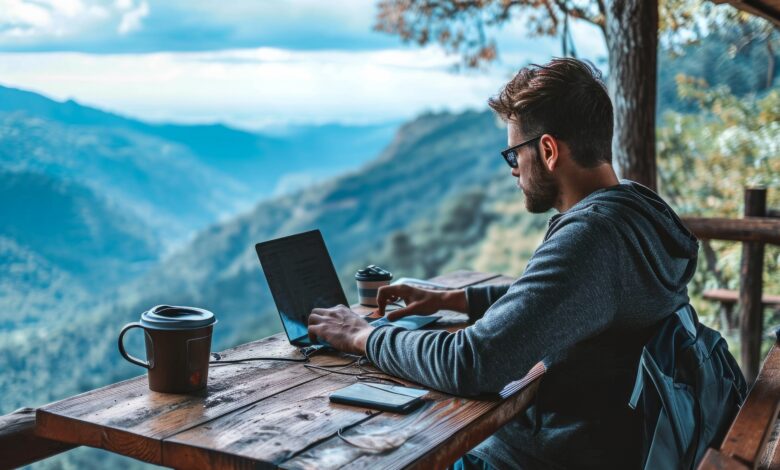Digital Nomad Essentials: How to Work Remotely While Exploring the World

Traveling with your laptop can feel like a strange mix of freedom and responsibility. You look out from a hotel balcony at a new skyline, the city hums below, and you think about the tasks you still need to finish before lunch. Many new remote workers try this lifestyle without much preparation. They find out quickly that staying productive while you wander from country to country takes more than wanderlust. It takes planning, steady habits, and a clear sense of how to work in new environments.
Plenty of digital nomads start in Southeast Asia. The region has warm weather, lively streets, and affordable places to stay. Someone who plans to pass through Malaysia usually checks different Hotels in Kuala Lumpur, often comparing neighborhoods and prices as they decide where to stay. A helpful page for that is Hotels in Kuala Lumpur, which gives a clear look at different places and makes it easier to pick a base for work and travel.
Every location has its rhythm. Some cities are calm in the morning and loud in the evening. Others are the opposite. A person who works remotely learns to adjust hour by hour. At times you feel like you are balancing two lives, one inside your screen and one out on the street. The trick is finding the points where these two worlds meet without fighting each other.
The Basics You Need Before You Take Off
Digital nomads come from many backgrounds, but their needs look surprisingly similar once they start traveling. You can carry a small bag, a camera, and a laptop, but the real essentials are the habits that keep your work from falling apart. These habits can be built before you leave home, which makes everything smoother later.
A sturdy laptop matters more than the brand. You can work from a train seat or a small cafe table. What helps most is keeping things simple. A good pair of headphones saves you when the room next door decides to hold a late-night chat. A power bank gives you breathing room when you find yourself away from an outlet. And a secure cloud storage account protects your files when your internet connection becomes slow or unstable.
People tend to forget about backup plans. A second email account, extra photocopies of important documents, and a little emergency cash tucked away in a pocket all help when something unexpected happens. You might lose your card or find yourself without internet for half a day. Planning for these moments avoids panic and keeps your focus on the work you need to finish.
Making Your Work Setup Feel Steady Anywhere
Productivity is easier when your surroundings feel familiar. Since you will be moving often, it helps to create small rituals that follow you from place to place. You might place your laptop on the same side of the table each time you work. You might start your morning with the same short task to warm up your mind. These patterns act like anchors. They help your mind settle even when everything outside your window changes each week.
Internet speed becomes a deciding factor in many cities. Some hotel listings mention strong wifi, but the real speed might fail once everyone starts streaming movies in the evening. Many digital nomads keep a backup mobile SIM card. That way, if the public connection slows down, you can use your own hotspot for uploads or client calls. Even a slow connection can handle emails or document edits as long as you plan.
Some remote workers also take short language classes when they stay in one place for a while. It helps them feel more grounded in the neighborhood. A useful site for learning is offered through this helpful language school option, which makes settling into local routines a little easier. Picking up simple phrases changes the way you move through a city, whether you are asking for directions or chatting with a local stall owner.
Choosing Where to Stay While You Work and Travel
Finding the right place to sleep and work is part instinct and part research. Hotels in Kuala Lumpur and similar cities offer a wide range of environments. You might pick a quiet business district for focus, or you might choose a lively street with food stalls so you can grab meals between tasks. Each traveler finds a different balance.
It helps to think about your preferred work style. If you like the calm of mornings, look for a room with good light and a desk. If you tend to work late into the night, search for something with strong air conditioning and reliable wifi. Sometimes a simple room in a tall building can feel like a peaceful corner of the world. Other times, you want a place near public transit so you can wander once your work is done.
Rooms with small kitchen areas can help with longer stays. You can buy fruit from a nearby stall or prepare simple meals instead of eating out three times a day. This gives you more control over your time and energy. A steady morning routine can make your workday feel smoother.
Building a Daily Rhythm That Works Across Borders
Time zones play tricks on digital nomads. One week, your calls happen in the afternoon. The next week, you are waking up before sunrise to stay in sync with your team. This shifting schedule can confuse your sleep pattern. To manage it, some travelers keep a fixed wake time, then adjust their breaks and work blocks around that.
A few gentle adjustments help your body handle new routines. Walking after meals keeps your mind clear. Water helps when you fly often since travel drains your energy more than you expect. Breaks in quiet parks or small cafes help keep your mind sharp for the tasks ahead.
Food becomes part of your rhythm too. Trying meals from a new country adds color to your days, yet it also helps to keep something familiar around. Nuts, fruit, or small snacks help when you need quick energy during long work blocks. Work feels easier when your body has a steady flow of fuel.
Useful Items Digital Nomads Often Bring
Some items become trusted companions for remote workers who travel a lot. They are not required, but they make life on the move smoother.
Items that help often include:
A small universal adapter
Noise-canceling headphones
A microfiber towel that dries fast
A tiny extension cord
A reusable water bottle
Simple packing cubes
An Ethernet adapter when wifi is unstable
Each item earns its place through real use, not guesswork. You might think you will never need the extension cord until you find yourself in a room with only one outlet behind the bed. These items remove friction so you can stay focused on your work.
Staying Productive When You Feel Restless
Almost every digital nomad has days when motivation feels far away. You look at your screen, then at the street below, and your mind drifts. This happens even to people who have been traveling for years. Instead of fighting the feeling, many nomads take brief walks to reset their focus. A short break helps your thoughts settle.
You also learn to forgive yourself on slower days. Productivity on the road is not a perfect line. There are ups and downs. What matters is that you keep moving and keep choosing routines that allow you to finish what you need without causing stress. A flexible approach keeps you steady.
If a city makes you feel restless, you can shift locations. Try a new cafe, a rooftop space, or a quiet library. Cities offer many small corners where you can work without distraction. Sometimes all you need is a slight change in scenery.
Balancing Work With the Joy of Travel
Working remotely while exploring the world gives you a special kind of freedom. Yet the freedom has structure hidden beneath it. You learn to balance work tasks with the pull of new streets and unfamiliar tastes. People who have lived this way for a while often talk about slow routines mixed with bursts of inspiration from the places they visit.
A city like Kuala Lumpur encourages that balance. You can finish your morning tasks, then head out to try new food or explore a quiet garden. The new sights help clear your mind and give you energy for the next work session.
Evenings hold their own charm. After the glow of your laptop fades, you might step out to walk through a night market or sit by a river path. These small joys become part of your work life. They keep you from feeling stuck.
Conclusion
Digital nomad life blends travel and work in a way that reshapes your sense of routine. It asks you to stay flexible, stay curious, and stay steady even when everything around you changes from week to week. With planning, a few smart habits, and a willingness to adjust, you can keep your work on track while enjoying the world in a way that feels rich and personal.
Every city offers something different. Kuala Lumpur gives wide choices for places to stay, and each neighborhood has its own rhythm. When you set yourself up with the right tools, the right mindset, and the right spaces, remote work becomes less of a challenge and more of a natural way to live. The road remains open, and your laptop becomes a companion rather than a burden.



